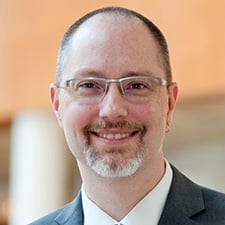With research linking professional burnout to higher rates of physician turnover, one of the preeminent names in American medicine has discovered that part of the solution lies in a little coffee talk.
Mayo Clinic found that giving physicians a way to gather in small groups for semistructured, private discussions in restaurants, coffee shops or reserved rooms results in measurably lower burnout and social isolation, and higher well-being and job satisfaction.
“Mutual support from colleagues to deal with the challenges of their field has long helped physicians manage the stress related to practicing medicine and derive meaning from their work,” according to Colin West, MD, PhD, a leader of Mayo Clinic’s Program on Physician Well-Being (PPWB).
Physician burnout thought leaders Tait Shanafelt, MD, and Lotte Dyrbe, MD, also led PPWB with Dr. West and helped to create the group meetings as part of an initiative dubbed COMPASS, which stands for Colleagues Meeting to Promote and Sustain Satisfaction.
“The goal of the COMPASS group meetings is to encourage collegiality, shared experience, connectedness, mutual support and meaning in work, thereby promoting well-being and a reduction of burnout and distress,” added Dr. West, an internist and professor of medicine, medical education and biostatistics at Mayo Clinic.
As outlined in an AMA STEPS Forward™ module, groups of six to 10 physicians meet for hour-long meetings held twice a month for half a year. Each COMPASS group has one leader responsible for organizing the meetings, and they are provided with three to four discussion topics or specific questions for each session.
Examples include:
- Think about one of your most satisfying days at work over the last month. What made this day so professionally satisfying? Share with your colleagues.
- Brainstorm ways to promote collegiality in your hallway or work unit.
- Choose one stressor that you can control, come up with two concrete ways you can reduce it, and commit to trying one approach within the next week.
As of January, more than 1,800 physicians and scientists have signed up to participate in COMPASS group meetings. That number represents nearly 5 percent of eligible individuals across all Mayo Clinic sites.
While the results so far are encouraging, Mayo leaders learned lessons that should prove helpful to other health systems or physician practices looking to launch a similar initiative. Here are four tips to help you implement a successful group meeting campaign.
Provide administrative support. Each group was responsible for its own scheduling. In some cases, groups needed more help to keep track of members and attendance. At Mayo Clinic, an internal website was created with links to contact information, discussion topics and other guidance for participants. A support staff member was also dedicated to the program and given a small amount of institutionally directed time to perform this role.
Add more fodder for discussion. After completion of the initial 12 meetings, a majority of the groups wanted to continue with their meetings. However, the discussion topics created for the program only covered about three rounds. After that, groups would have to repeat topics until more content was developed. To overcome this obstacle, practices and organizations should create additional topics to discuss to keep the collegial meetings going.
Maintain flexibility with group assignments. Pay attention to how group assignments are determined and be prepared to adjust accordingly. There are some health professionals who will only participate if their close colleagues also sign up. However, there are others who will only partake in groups that are outside of their clinical circles. Be mindful of this.
Protect time and resources. Instead of processing thousands of one-off dining receipts for payment, offer reimbursement through existing institutional mechanisms such as a corporate travel card. This costs less money. Participants said the most challenging aspect of the COMPASS groups was finding the time to engage with their colleagues in a meaningful way. It is important, organizationally, to prioritize opportunities for physicians to join together for these critical conversations.
“There is no single solution to the physician burnout crisis. However, each additional evidence-based tool added to the menu of interventions an organization can provide increases the chance that every physician will benefit in some way,” said Dr. West. “Ultimately, the hope is that patients will receive care from physicians who find joy, purpose and meaning in their work.”
The AMA’s STEPS Forward™ collection offers free online modules that help physicians and system leaders improve well-being, including learning about the organizational changes that lead to physician satisfaction and improving resiliency.
Several modules have been developed from the generous grant funding of the federal Transforming Clinical Practices Initiative (TCPI), an effort designed to help clinicians achieve large-scale health transformation through TCPI’s Practice Transformation Networks.
The AMA, in collaboration with TCPI, is providing technical assistance and peer-level support by way of STEPS Forward resources to enrolled practices. The AMA is also engaging the national physician community in health care transformation through network projects, change packages, success stories and training modules.




